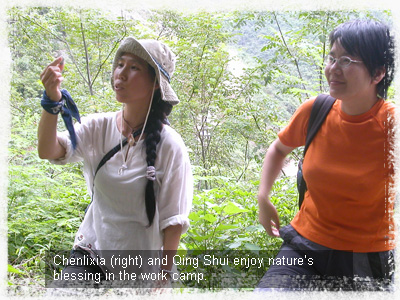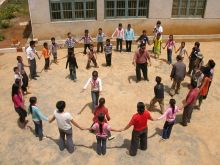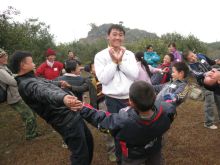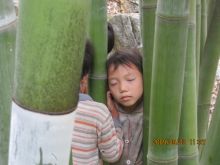"Euphrates Poplar" (Original name: Chen Lixia, former Project Assistant of PCD in Guangxi)
 In the autumn of 2009, PCD organized a work camp on Affective Nature Education at Jiuliliang in Yanqing County, Beijing. Below is my feedback on the work camp.
In the autumn of 2009, PCD organized a work camp on Affective Nature Education at Jiuliliang in Yanqing County, Beijing. Below is my feedback on the work camp.
Walking with Beauty in Life
The colours of autumn are truly beautiful and I have had so little opportunity to walk amidst [this?] beauty. It's rather a long trip from southern China to the north, where the woods are a blaze of colours. Because of this, to experience those dazzling autumn colours I often have to plan meticulously. However, my meeting with it this time was so unanticipated that I was, needless to say, overjoyed. Since it was such a fleeting chance, the duration inevitably felt brief, the place where we could spend our free time too constrained, and the times to enjoy the autumn colour too little. As I sat below a tree as the autumn leaves fell, and as I felt the warmth of the sun and reminisced about my every encounter with autumn colours, I couldn't help wondering: Nature withers and blooms annually; this fact is not hidden from us human beings. However in the past, I have spent so little time with it. If I haven't been walking with beauty in my life, with whom have I been walking?
Enriching the World with Our Mind
So long as we "have heart" (having confidence, paying close attention and being mindful…) [1], what is simple and plain can be enriched. On the first day of the experiential training, our teacher Clear Water[2] demonstrated to us how a simple hill track can be full of interesting things. She made use of a walking stick for the blind and a camera, and invited us to use our physical organs to crawl, smell and touch. It became a banquet of the senses, integrating play and learning. On the second day, girls in the group to which Sunshine (natural name)[3] belonged suggested using sunshine as a theme to design activities for direct experience. For me this task was really difficult, but Autumn Group made a concerted effort and managed to design a remarkable game: we imagined we were trees and tried to feel the warmth, the intensity and the colour of sunshine. On the fifth day, while discussing a game about "biological chains", Autumn Group talked about how we could ingeniously place the concept of both losing and winning into the biological-chain context, to prevent participants placing too much emphasis on winning. For example we could make use of our knowledge of biological chains and explain how goldfish eat mosquitoes, which in turn are food for goldfish… If I hadn't listened mindfully, I might have neglected all these details because the games appeared so simple.
Learning the Way of Nature
Learning from Nature doesn't just mean learning to connect with Nature. It also means learning to connect with others and with oneself. At every stage of Flow Learning, the instructor has to consider three aspects of relationship: that between human beings and Nature, between human beings, and between human beings and the self. When an instructor designs and facilitates an activity, he/she has to have an understanding of the needs of the participants in these three aspects, and the order of these needs. When designing an activity about relationships between human beings, or between human beings and the self, one should make use of natural materials, to ensure participants gain experience and understanding from nature in their reflection. For example, participants may be told to give themselves a gift from Nature, or tell a tree what is on their mind.
Commonplace yet Extraordinary
One in a while the[my?] angel[4] "Xiaowan" gave me something – an apple, a peach, a shawl, a small book … Because such behaviour appeared so commonplace I paid little attention to the care and concern that lay behind it. Even when the game was over and she revealed her identity, I couldn't remember these actions. When Falcon read and sang his work, "Ocean of Heart" in his unattractive voice, someone wept quietly. However when Winter Plum and Gourd Seedling sang the same song in their beautiful voice, the same person didn't weep. Perhaps it was just because the singing voice of Falcon was so ordinary; for this person it was connected with everyday life and could therefore connect with their emotions and feelings. After all, every word of "Ocean of Heart" comes from deep inside of Falcon, and has a touch of the roughness of life. When it's sung by another person, no matter how beautifully, it's hard to bring out the feeling about life that belongs to them both, and that made this person weep.
On the last day of the work camp, I began to miss the landscape of Jiuliliang and so I wrote the two poems below. They were entitled "Thoughts on Jiuliliang":
Thoughts on Jiuliliang 1:
The fallen leaves at Jiuliliang are still flipping and flying in my heart
but they will soon leave behind only a splash of deep autumn colour
The people at Jiuliliang are still flashing and spinning in my brain
but they will soon leave behind only a dash of strong emotion
Thoughts on Jiuliliang 2:
We, a small group of roamers
Unintentionally got into
a profound scenery, woven by autumn colours and emotions
Lightly we leaped
without being able to penetrate such profundity
but we harvested the joy that belonged to us
1. Translator's note: The writer uses the Chinese phrase youxin and plays on the two Chinese characters you, which means "to have," and xin which literally means "heart". In Chinese, confidence is xinxin, paying close attention is xixin and being mindful is yongxin. The author wants to say that to "have heart" also means having these three qualities.
2. Our teacher Clear Water (Qingshui) is one of the few instructors on affective nature education in China. She is a founding member of the RTC Gaia School in Hong Kong and occasionally serves as a facilitator for PCD's training.
3. In affective nature education, the instructor often requests the participants to give themselves names in relation to nature, as a way to build a link between the participants and nature.
4. In one game in affective nature education, every participant will choose to become the angel of another participant and take care of him/her without their knowing it. The angel will reveal his/her identity during feedback at the end of the game.
Other sharings:





